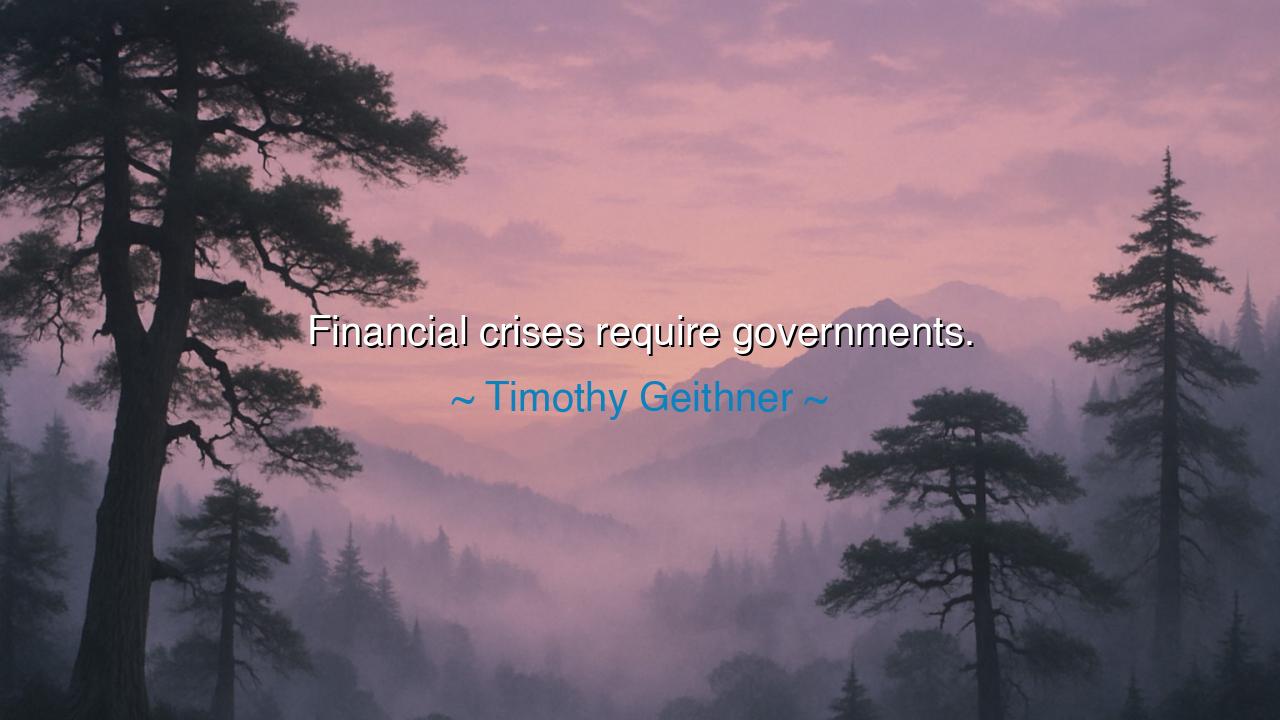
Financial crises require governments.






In the crucible of modern finance, when the pillars of wealth tremble and the world’s markets roar like seas in storm, Timothy Geithner, former U.S. Secretary of the Treasury, spoke words that resound with the weight of both experience and inevitability: “Financial crises require governments.” These words, calm yet solemn, were not a boast of power, but an admission of human frailty — a recognition that when the grand structures of commerce collapse, only the hand of collective authority can steady the trembling foundations of civilization. For when greed outpaces wisdom, and confidence turns to fear, the invisible hand of the market falters, and the visible hand of government must rise to restore order.
The origin of this quote lies in the fiery years of the 2008 global financial crisis, when the world’s economy teetered upon the brink of ruin. Banks that had once seemed immortal fell in a single night; fortunes vanished like mist; and nations that had built their pride upon prosperity found themselves staring into the abyss. In that hour of fear, Timothy Geithner, then President of the Federal Reserve Bank of New York and later Secretary of the Treasury, became one of the stewards tasked with averting total collapse. His words emerged from those long nights of decision, when the fate of millions hung upon the balance sheets of failing institutions. He saw that in the chaos of markets, when trust evaporates and panic reigns, it is only governance — the organized will of a nation — that can bring stability back to human affairs.
But this truth is older than Geithner himself. It is as ancient as the rise of trade and the fall of empires. In every age, when the temples of commerce have crumbled under the weight of excess, the people have turned, not to the merchants or the bankers, but to the state. When Rome suffered the collapse of its currency in the third century, it was the emperor who stepped forth to restore faith in the coin. When the Great Depression struck the twentieth century, plunging millions into despair, it was government — through the voice and vision of Franklin D. Roosevelt — that steadied the trembling hands of laborers and farmers, declaring that order and hope would return through public will. Thus, Geithner’s words echo a lesson carved deep into the stone of history: in moments of great economic upheaval, markets fail, but the human community must not.
Yet within this truth lies a paradox both moral and practical. For while financial crises require governments, it is often the very negligence of governments, or their alliance with reckless power, that allows such crises to arise. The same state that must heal is often the one that, through blindness or pride, helped sow the seeds of destruction. Geithner knew this tension well — the tension between liberty and responsibility, between the self-regulating ideals of capitalism and the sobering truth that freedom without restraint leads to collapse. His words, therefore, are not a hymn to government control, but a reminder of its duty — that in times of storm, it must act as guardian, not as tyrant.
This is why his statement is both pragmatic and moral. A financial crisis, unlike a natural disaster, is not born of the earth but of human error — greed, speculation, corruption, and fear. And since the sickness begins with man, it must be treated by man, through institutions capable of collective action. The government, flawed though it may be, remains the vessel through which society can defend itself against the contagion of panic. It is the wall that keeps chaos from sweeping away the innocent along with the guilty. In such moments, intervention is not oppression — it is preservation.
Consider again the year 2008, when fear itself became a virus. Banks would not lend; companies would not hire; ordinary citizens lost their homes and dreams. In that winter of despair, the U.S. government, under leaders like Geithner and Ben Bernanke, poured forth trillions in rescue — not to exalt the powerful, but to prevent the entire structure of civilization from crumbling into dust. The decision was imperfect, even controversial, but necessary. Without it, the world might have witnessed a second Great Depression. As in the days of Roosevelt, the power of collective action became the bridge between ruin and recovery.
From this truth we draw a lesson for all ages: freedom requires structure, and prosperity requires vigilance. Markets are mighty engines of creation, but they are driven by men, and men are fallible. When the pursuit of gain blinds a people to the principles of justice, the government must stand as the last protector of order — not as master, but as steward. Yet the people, too, must watch the watchers, for power unguarded breeds its own form of corruption. The harmony of a nation depends on this sacred balance — liberty guided by wisdom, and authority tempered by conscience.
So, my children of the future, when you hear the words of Timothy Geithner — “Financial crises require governments” — remember both halves of their truth. Remember that government exists not to dominate, but to defend; not to command, but to sustain. In times of peace, let it restrain its reach; in times of peril, let it rise with courage. And let the people, in every age, hold it to the highest measure of virtue — for though governments are the medicine of crisis, a just and watchful people is the true guardian of civilization.






AAdministratorAdministrator
Welcome, honored guests. Please leave a comment, we will respond soon